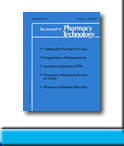 |
 |
Cognitive Impairment and Medication
Complexity in Community-Living Older Adults:
The Health, Aging
and Body Composition Study
David SH Lee, Nathalie de Rekeneire, Joseph T Hanlon,
Thomas M Gill, Douglas C Bauer, Bernd Meibohm,
Tamara B Harris, and Sean M Jeffery
To request full article click here.
Background: Medication complexity is a large determinant of adherence. Few studies have explored the relationship between cognitive impairment and medication complexity.
Objective: To evaluate whether cognitive impairment is associated with medication complexity for prescription and over-the-counter (OTC) medications.
Methods: In this cross-sectional analysis, we studied the association between cognitive impairment and the complexity of prescription and OTC drug regimens. Baseline participants were from the Health, Aging and Body Composition study, consisting of 3075 well-functioning 70- to 79-year-old black and white men and women. Cognitive impairment was defined by having a Modified Mini-Mental State Examination score <80. The complexity of prescription and OTC (including supplements/herbals) medications was assessed using a modified version of the Medication Regimen Complexity Index (mMRCI). The mMRCI score increases with complexity of dosage forms, number of medications, pill burden, and nondaily dosing.
Results: The mean (SD) age was 74 (2.9) years (n = 3055; 52% female, 41% black). The median prescription mMRCI score was 6 (range 0-66). The median OTC mMRCI score was 4 (range 0-71). Adjusting for health status, demographics, and access to care, medication complexity was lower in participants with cognitive impairment for prescription (adjusted RR 0.89; 95% CI 0.80 to 0.99) and OTC medications (adjusted RR 0.76; 95% CI 0.64 to 0.93) compared to those without cognitive impairment. The number of prescription medications was not different, but the number of OTC drugs was lower for those with cognitive impairment.
CONCLUSIONS: In this cohort of well-functioning older adults, those with cognitive impairment had lower prescription complexity due to less-complex dosage forms, pill burden, or daily dosing. OTC complexity was also lower, primarily due to a lower number of OTC drugs. The results of this study show that further research on medication complexity and adherence and health outcomes in cognitively impaired individuals is warranted.
J Pharm Technol 2012;28:156-62
To request full article click here.
|
|
|
||
|

